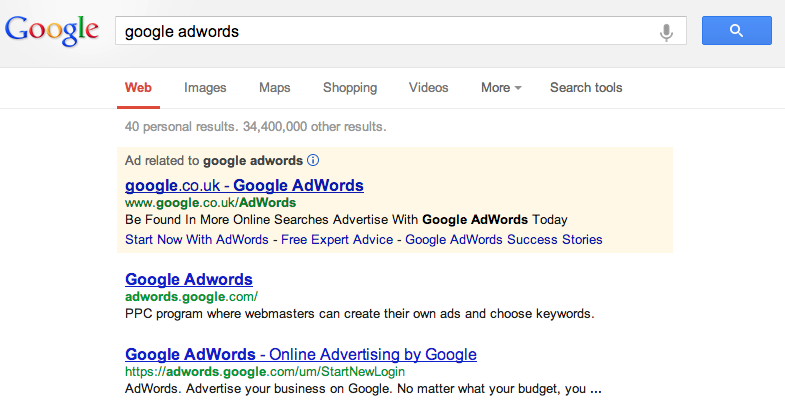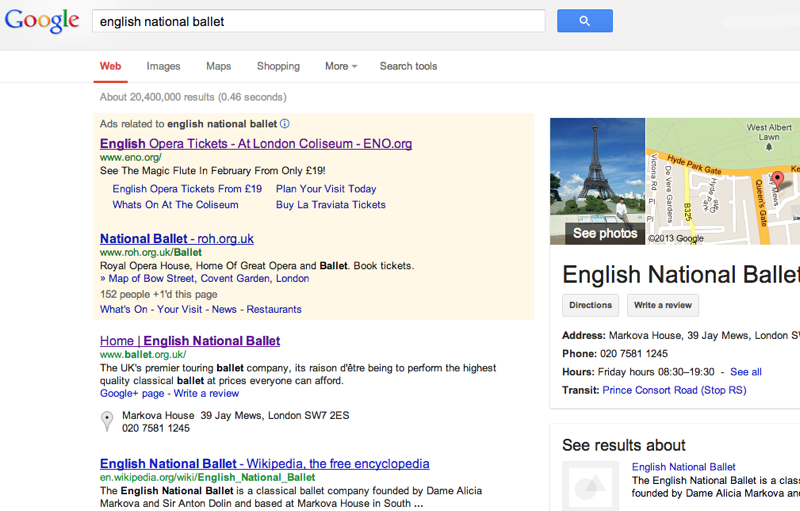Arts organisations and branded AdWords
For the second post in my Arts Analytics series I wondered how many of my group of 100 arts organisations are using Google AdWords.
I’m sure you’ll come across AdWords before. You create adverts and choose keywords. When people search on Google using one of your keywords, the ad you made may appear next to the search results (as in the screenshot below). You only pay when a person clicks on your advert.

However, finding which organisations are using AdWords might’ve been a little tricky, so I decided to be more specific.
I looked at which organisations are buying branded keywords – that is, keywords matching their organisation’s name. It’s easier for me to research (I just have to Google the organisation’s name) and it has some additional significance, which I’ll explain below.
Findings
Of the 100 arts organisations in my sample group, at least 16 are buying branded AdWords.
I say ‘at least’ because there’s no guarantee I’ll see them all, for reasons I’ll explain below. Here’s the full list of ones I found:
I Googled each organisation’s name at around 10pm on 30 January 2013.
Why buy branded AdWords?
So why would you do this? Surely if anyone searches for the name of your organisation you’re more than likely to be top of the search results already, right? Are the organisations that buy branded AdWords just throwing their money away? Well, no. Or at least probably not.
There are a few reasons why you might buy AdWords keywords for your organisation’s name:
- Because it delivers extra traffic. Google recently published research that backs up what many in the PPC industry already knew – buying keywords adds to your traffic, rather than cannibalising organic search traffic.
- Because with Google Grants you might as well. You’ve applied to Google’s programme that gives charities you $10,000/month in AdWords credit for free, right? RIGHT?
- Because someone else might. You don’t want to be trumped by a competitor, do you?
Of course, that last one is more of a defensive play, better suited to the cutthroat commercial world of online betting, pharmaceuticals and so on. Or so you might’ve thought…
It’s noticeable that the London-based opera companies in my sample group all seem pretty up on their AdWords. What’s more, English Touring Opera, English National Opera and the Royal Opera House don’t just advertise against their own names but often against each other too. They branch out too – when I did a search for English National Ballet, this is what came up… (click to enlarge)

There’s no rule against doing this, by the way. All’s fair in digital marketing.
Or I could be wide of the mark and it’s not deliberate, it’s just down to some broad keyword matching. Still, it made me chuckle.
Why not buy branded AdWords?
Now, I’m not saying that the other organisations on the list don’t know what they’re doing – I really can’t tell that from my quick bit of research. There are actually some very good reasons why I may not have seen other organisations buying branded AdWords:
- Maybe they’ve found that other keywords produce better results and so are prioritising those.
- I could be excluded from seeing their ads by regional targeting.
- Maybe their ad inventory had been used up by the time in the evening I came to do my searching.
- High demand may have pushed the price of the keyword out of the range of their bidding (it happens where there’s a strong secondary market for an organisation’s tickets, for example)
Maybe I’ll look a bit closer at that last point in the next Arts Analytics post.
How to measure the effect of your branded keywords
You could just log into AdWords and see how often the ad is clicked on but that’s a bit… well, average.
Want to do better? Here’s one way. Firstly, this only works if you’ve set up ecommerce tracking in Google Analytics and also hooked up your Google Analytics linked to your AdWords account.
As long as that’s all sorted, log into your Analytics account then come back and click this link: End to End Paid Search Report.
It’ll generate a custom report that will show, per keyword, how much you’re paying for the traffic you’re getting and how much revenue is generated as a result of it. Have a dig around and read more about the report and how to use it over on Avinash Kaushik’s website (he’s the one who made that custom report).
Recommendations
- If you’re eligible, apply for the Google Grants programme
- Connect your AdWords account to your Google Analytics for greater insights
- Buy AdWords for your organisation’s name (and any variations)
- Measure the effect (see if that traffic converts according to your website’s goals)
If any of this sounds too difficult or time-consuming, you could always pay someone to set up your account properly and manage things for a bit. After a while, you could decide whether to carry on with an agency or take over management of your AdWords account yourself. Just a thought.
If this post was useful then please consider sharing it with others. Sign up for the free Arts Analytics newsletter too, it’ll be great.